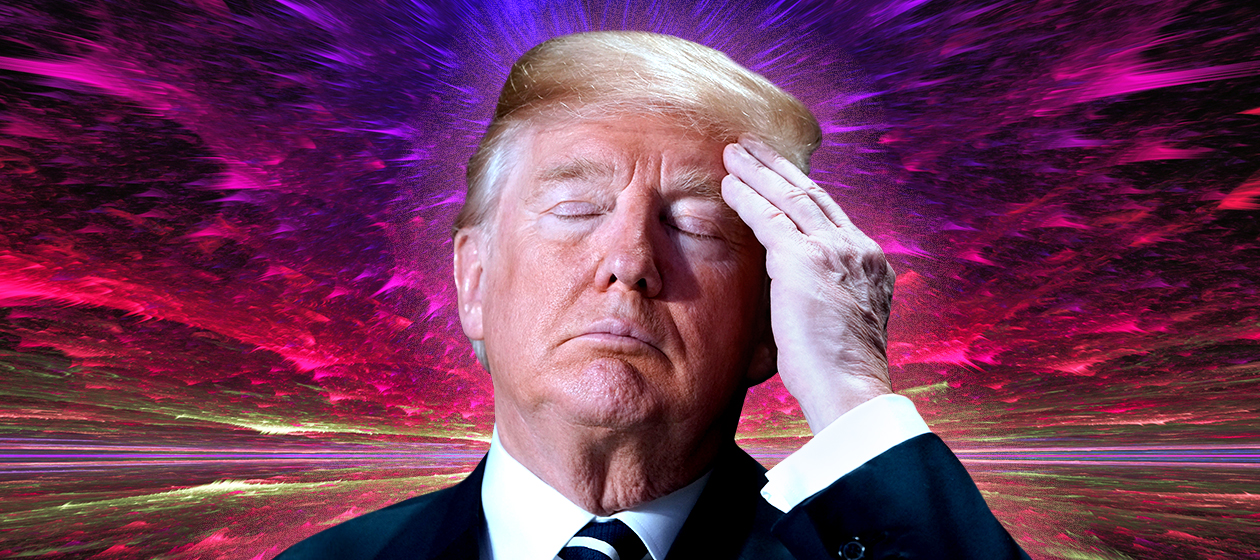Donald Trump, American mystic
For all his empty bluster on taxes and trades, the president is guided by little more than instinct and the pursuit of etherealities like "Aura"


A free daily email with the biggest news stories of the day – and the best features from TheWeek.com
You are now subscribed
Your newsletter sign-up was successful
The liberal glee that followed Harley-Davidson's cynical announcement that in order to save money it was firing hundreds of workers and moving their jobs to an overseas factory has been unmistakable. "The first layoffs from Trump's tariffs are here," sang The Washington Post, as if heralding the arrival of a new Marvel movie trailer. At The New Yorker, that bastion of Friedmanite classical liberalism, John Cassidy wrote a moving apologia on behalf of the poor put-upon corporation. Such are the tones in which we are now accustomed to hearing journalists greet the news of American immiseration.
But who can blame them? If the point they are making is that President Trump, despite his promises, is not saving American manufacturing jobs, they are right. What is happening now, not only at Harley-Davidson but at smaller companies across this country — including this auto parts factory in St. Joseph County, Michigan, where nearly one in four children and more than a tenth of persons over 65 live in poverty — is a confirmation of this. But despite what feckless pundits are happy to argue on behalf of greedy corporations, Harley's decision has almost nothing to do with Trump's so-called "trade war." Instead, it is an entirely predictable consequence of the tax bill passed by his party last year.
This is something the president himself accidentally admitted on Tuesday morning:
The Week
Escape your echo chamber. Get the facts behind the news, plus analysis from multiple perspectives.

Sign up for The Week's Free Newsletters
From our morning news briefing to a weekly Good News Newsletter, get the best of The Week delivered directly to your inbox.
From our morning news briefing to a weekly Good News Newsletter, get the best of The Week delivered directly to your inbox.
What we are witnessing here is not the gradual unfolding of a carefully devised master plan but the flailing of a president guided only by his own instincts and (and in this case it would seem literally) magical intuitions. What exactly does he mean by "Taxed like never before!" — is he suggesting that he is going to beg Mitch McConnell and Paul Ryan to reverse last year's tax cut package, a bill rammed through Congress and signed with such heedless alacrity before a looming Christmas deadline in December that it took eight months for anyone to realize that a provision of it now technically in effect would tax, for example, Catholic priests living in rectories with an attached garage? Or does he mean that he is going to pass legislation specifically designed to punish Harley, raising the tax rate for a single corporation? To quote one of our foremost anti-boomer intellectuals, "No thought was put into this."
For someone who claims to be an expert at deal-making, the president seems almost willfully naïve about how you go about convincing another party to do something. As a result of the GOP bill, Harley's tax burden decreased by almost a third overnight. They chose to respond to this totally unbidden concession in January by announcing the closure of a plant in Missouri and spending $700 million on stock buybacks. Now they claim that the European Union's tariffs on a number of American goods leave them with no choice but to shift more production to southeast Asia, even though their own unreliable public estimate of the cost is $90 million, a fraction of what they have already been given by Trump and the GOP.
An increase in outsourcing is exactly what people like Rep. Rosa DeLauro (D-Conn.), one of the few consistent opponents of free trade in American politics, said would happen in response to the bill's creation of a territorial tax system. She was right. Now there is nothing the administration can do about it.
The most telling part of Trump's response is not the empty bluster about raising taxes but his offhand reference to the disappearance of something called "the Aura." It is not exactly clear what the Aura is supposed to be. Perhaps it is a mass of glowing red, white, and blue-colored energy from which real American patriots derive their inner strength, the secret fire that powers skyscrapers, fastballs, monster trucks, eagles, rocket ships, gas grills, jet skis, and, of course, cowboys on steel horses. The president seems to be under the impression that America has some kind of mystical destiny, one in which providence has arranged a significant role for certain kinds of motorcycles and certain brands of blue jeans and, probably, NASA.
A free daily email with the biggest news stories of the day – and the best features from TheWeek.com
This is, in its way, a beautiful thought. It would be nice to imagine, as President Ronald Reagan did 35 years ago, that there is something indelibly American about Harley-Davidson and its motorcycles that entitles it to special protection against foreign competition, protection for which the company might show gratitude by occasionally having considerations other than profits.
But corporations do not believe in the Aura, Mr. President. It doesn't exist.
Matthew Walther is a national correspondent at The Week. His work has also appeared in First Things, The Spectator of London, The Catholic Herald, National Review, and other publications. He is currently writing a biography of the Rev. Montague Summers. He is also a Robert Novak Journalism Fellow.
